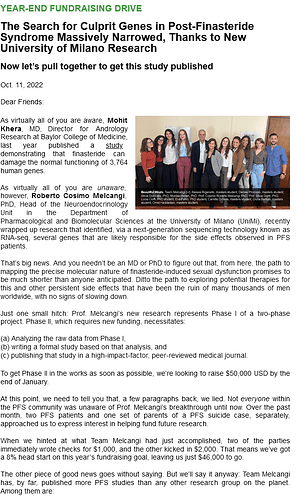This has been posted elsewhere, but here is PFS Network’s position on this latest announcement.
Dear fellow patients,
We have received many inquiries from patients related to the PFS Foundation’s latest announcement of a fundraising drive to support new research from Prof. Melcangi’s group at the University of Milan. Patients have rightly asked how they should approach this announcement and whether this study is worthwhile contributing to. While on the surface this announcement seems promising, we at PFS Network have some concerns.
Past research into PFS has largely not adequately acknowledged the complete clinical picture and breadth of symptoms that have been reported by patients for over two decades. This is true of Prof. Melcangi’s own research, which has notably ignored physical symptoms that can be debilitating for many patients. Instead, symptoms have been fitted around his hypotheses, rather than vice versa. Given the rarity of this condition and therefore the limited size of our community, we simply cannot continue to support projects that do not acknowledge all symptoms of the disease and are not grounded in the clinical reality affecting patients. Doing so would put a drain on what are already limited resources we have at our disposal. Until Prof. Melcangi’s group can demonstrate such a complete picture, and present a hypothesis which can plausibly explain all of the symptoms being reported, we cannot support this work.
Additionally, Prof. Melcangi wrote to our charity two months ago requesting assistance for a completely unrelated study. We are concerned that the approach being taken at the University of Milan is haphazard and directionless, and lacks a clear trueline. As a patient-led charity, primarily focused on advocating for a small, vulnerable, and neglected patient community, we cannot endorse this.
We are also deeply concerned with the way this study has been presented to a vulnerable and desperate patient community. The work has been presented as a “breakthrough” which has “massively narrowed” the genes involved in PFS. Some clarification on what has been narrowed down (the genes which predispose patients to developing PFS or the pathomechanisms involved) would be helpful. There is an alarming lack of detail. As far as our group is aware, the RNA sequencing involved does not involve human samples, but rather an experimental rat model. Without an understanding of the pathomechanisms or genetic components involved in PFS, a rigorous and accurate animal model simply does not exist.
Over the past few years, our group has been in consultation with well-credentialed geneticists, including some of the top experts in the field. For this announcement to make such claims is not only extraordinary, but entirely irresponsible. To draw meaningful insights from any genetic study, huge statistical power is required, which is not the case here. These bold claims being made to a vulnerable patient community are concerning and dangerous.
To summarise: PFSN is concerned with the way this study has been presented to the community. Furthermore, while we are left without a clear outline of the methodology or study’s parameters, we are skeptical of the study’s design and the accuracy of the animal model that’s been used. While we will not be supporting this study financially, if patients wish to allocate funds to this work they should feel free to do so. However, given our fundamental concerns, we cannot allow patients to use our platform to solicit funds for this. If you wish to discuss the study, you are more than welcome, but any direct attempts to solicit funds will be removed.
If you are seriously contemplating a contribution and would like to ask additional questions, please feel free to reach out privately.
Best wishes,
PFSN team



